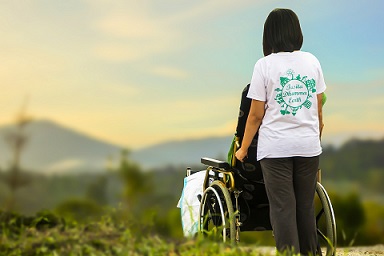A resident individual suffering from permanent physical disability or mental retardation including blindness, loss of voice, autism, cerebral palsy and multiple disability as per rule 11D is eligible to get tax deduction under section 80U of Income tax act, 1961.
Rememeber, tax deduction under section 80U is not available if the taxpayer is non-resident in India for the relevant assessment year. Provisions of Section 80U is applicable to both citizen of india and foreign country if they are resident in India.
Many taxpayers gets confused between section 80U and 80DD. As per section 80U, a resident individual suffering from disability himself gets tax deduction of Rs. 75,000 or Rs. 1,25,000. On the other hand, section 80DD is applicable to those individuals whose dependent family member is suffering from a disability.
Detail provision of section 80DD can be referred to in our earlier article.

Amount of tax deduction U/s 80U for Disabled Individuals
A fixed tax deduction of 75,000 rupees is allowed under section 80U if the assessee is suffering from any disability.
If the person has severe disability, the deduction allowed is 1,25,000 rupees instead of 75,000 rupees.
Assessee is not required to submit any medical bill, certificate or any other receipt at the time of filing the income tax return.
However, a copy of the certificate issued by medical authority has to be kept by the assessee. If assessee is employed, then such certificate has to be submitted to the employer for tax deduction at source (TDS) calculation.
Section 80U talks about fixed or flat deduction irrespective of assessee’s actual expenditure.
If the conditions of section 80U is satisfied, then a fixed deduction of 75,000 rupees is available. With any disability of 80% or above (severe disability), the taxpayer can claim a higher tax deduction of 1,25,000 rupees.
Table showing tax deduction under section 80U for Disabled Individuals
| Category | Flat Tax deduction allowed under section 80U |
| Resident individual is suffering from 40% or more of one or more disability | 75,000 rupees |
| Severe disability – resident individual is suffering from 80% or more of one or more disability | 1,25,000 rupees |
As discussed above, tax deduction under section 80U is not available to NRIs. However, a foreign citizen who is resident in India can take this benefit.
Procedure to get tax deduction under section 80U
To get tax deduction under section 80U, the assessee is required to furnish a copy of the certificate issued by the Medical Authority, in form 10-IA.
After the expiry of the medical certificate, assessee is required to issue a fresh certificate in order to continue to claim tax deduction.
As per tax law, following kind of medical authority can certify a person to be disabled;
- A Civil Surgeon or Chief Medical Officer (CMO) of a government hospital.
- A Neurologist with an MD in Neurology.
- In case of children, a Paediatric Neurologist having an equivalent degree.
Disabilities, medical authority, person with severe disability are defined in “The Persons with Disability (Equal Opportunities, Protection of Rights and Full Participation) Act, 1995” .Persons suffering from any of the following kinds of disabilities as certified by a medical authority qualify for tax deduction u/s 80U.
- Blindness
- Low vision
- Leprosy-cured
- Hearing impairment
- Loco motor disability
- Mental retardation
- Mental illness
- Autism
- Cerebral palsy
If the taxpayer opts for the alternative tax regime under section 115BAC, then tax deduction under section 80U is not available. This provision is applicable from the assessment year 2021-22. For the financial year 2023-24, if you have opted from alternative tax regime under section 115BAC, then tax deduction U/s 80U can not be claimed.
Can both section 80U and 80DD tax deductions be taken
For example, assume for a moment, Mr. A who is a resident individual is suffering from a severse blindness as certified by the medical authority.
He is completely dependent on his brother Mr. B for support and maintenenace.
During the financial year, Mr. B incurs medical expenditure of Rs 5,000 for Mr.A. Mr. A’s income is Rs 22,000 and Mr. B’s income is Rs 35,00,000.
| Particulars | Mr. A (Rs.) | Mr. B (Rs.) |
| Gross Total Income | 22,000 | 35,00,000 |
| Less: Tax Deduction U/s 80C to 80U | ||
| Tax Deduction U/s 80DD | – | 1,25,000 |
| Tax Deduction U/s 80U | – | – |
| Net Income | 22,000 | 33,75,000 |
Remember, If tax deduction is calimed by Mr. A under section 80U, then no deduction will be available to Mr. B U/s 80DD. As Mr. A’s income is below taxable limit, its better if Mr. B takes the tax deduction under section 80DD instead of taking tax benefits u/s 80U for Mr. A’s income.
Frequently Asked Questions on tax deduction U/S 80U
Who can claim tax deduction under section 80U?
A resident individual who has a prescribed disability of 40% or more can claim tax deduction under section 80U of the Income Tax Act, 1961.
How to claim the tax deduction U/S 80U?
The resident individual with physical disabilities can claim tax deduction U/S 80U by filing income tax return woth the government. Provided they must satisfy all the conditions to claim such tax deduction.
What is the maximum tax deduction limit under section 80U?
As per section 80U, the amount of tax deduction available to a disabled individual is fixed Rs 75,000.
If such resident individual has 80% or more disability, the fixed tax deduction amount is Rs 1,25,000.